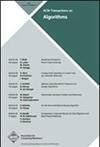分支收缩超图中的最小割和最小k割
IF 1.4
3区 计算机科学
Q3 COMPUTER SCIENCE, THEORY & METHODS
引用次数: 0
摘要
对于具有m个超边和n个顶点的超图,其中p表示超边的总大小,我们提供了以下结果:•我们给出了一个在\(\widetilde{O}\left(mn^{2k-2}\right) \)时间内运行的算法,用于在任意秩的超图中找到最小k-cut。该算法优于之前的最小k切问题的最佳运行时间,对于k >2.•我们给出了一个运行时间为\(\widetilde{O}\left(n^{\max \lbrace r,2k-2\rbrace }\right) \)的算法,用于在常数秩r的超图中寻找最小k-切。该算法优于先前的最小k-切和最小k-切问题的最佳运行时间。我们的两个算法都是蒙特卡罗算法,也就是说,它们以高概率返回最小k-cut(或最小切割)。这些算法作为超图上一般分支随机收缩技术的实例,扩展了Karger和Stein关于图上递归收缩的著名工作。我们的技术和结果也推广到对冲图上的最小对冲切割和最小对冲k-切割问题,这是超图的推广。本文章由计算机程序翻译,如有差异,请以英文原文为准。
Minimum Cut and Minimum k-Cut in Hypergraphs via Branching Contractions
On hypergraphs with m hyperedges and n vertices, where p denotes the total size of the hyperedges, we provide the following results:
• | We give an algorithm that runs in \(\widetilde{O}\left(mn^{2k-2}\right) \) time for finding a minimum k-cut in hypergraphs of arbitrary rank. This algorithm betters the previous best running time for the minimum k-cut problem, for k > 2. | ||||
• | We give an algorithm that runs in \(\widetilde{O}\left(n^{\max \lbrace r,2k-2\rbrace }\right) \) time for finding a minimum k-cut in hypergraphs of constant rank r. This algorithm betters the previous best running times for both the minimum cut and minimum k-cut problems for dense hypergraphs. | ||||
求助全文
通过发布文献求助,成功后即可免费获取论文全文。
去求助
来源期刊

ACM Transactions on Algorithms
COMPUTER SCIENCE, THEORY & METHODS-MATHEMATICS, APPLIED
CiteScore
3.30
自引率
0.00%
发文量
50
审稿时长
6-12 weeks
期刊介绍:
ACM Transactions on Algorithms welcomes submissions of original research of the highest quality dealing with algorithms that are inherently discrete and finite, and having mathematical content in a natural way, either in the objective or in the analysis. Most welcome are new algorithms and data structures, new and improved analyses, and complexity results. Specific areas of computation covered by the journal include
combinatorial searches and objects;
counting;
discrete optimization and approximation;
randomization and quantum computation;
parallel and distributed computation;
algorithms for
graphs,
geometry,
arithmetic,
number theory,
strings;
on-line analysis;
cryptography;
coding;
data compression;
learning algorithms;
methods of algorithmic analysis;
discrete algorithms for application areas such as
biology,
economics,
game theory,
communication,
computer systems and architecture,
hardware design,
scientific computing
 求助内容:
求助内容: 应助结果提醒方式:
应助结果提醒方式:


